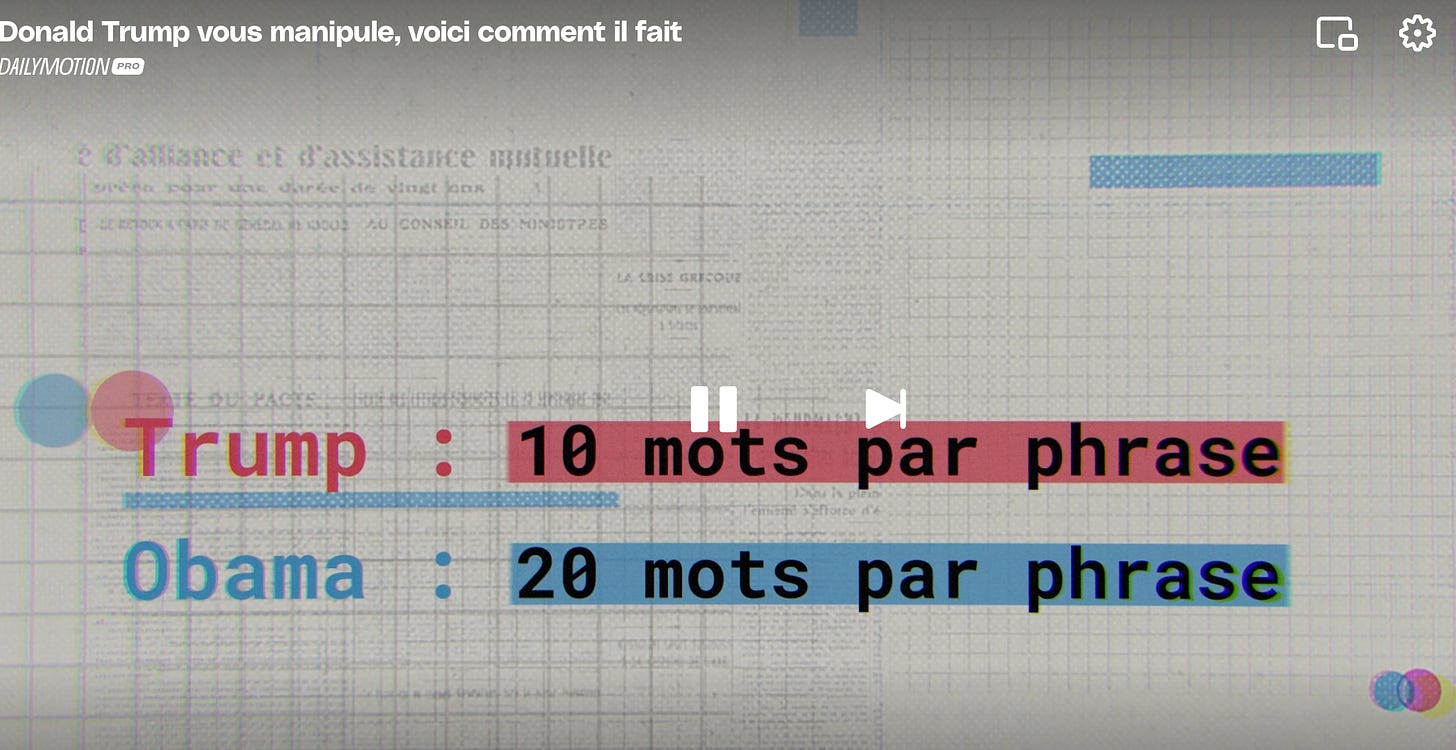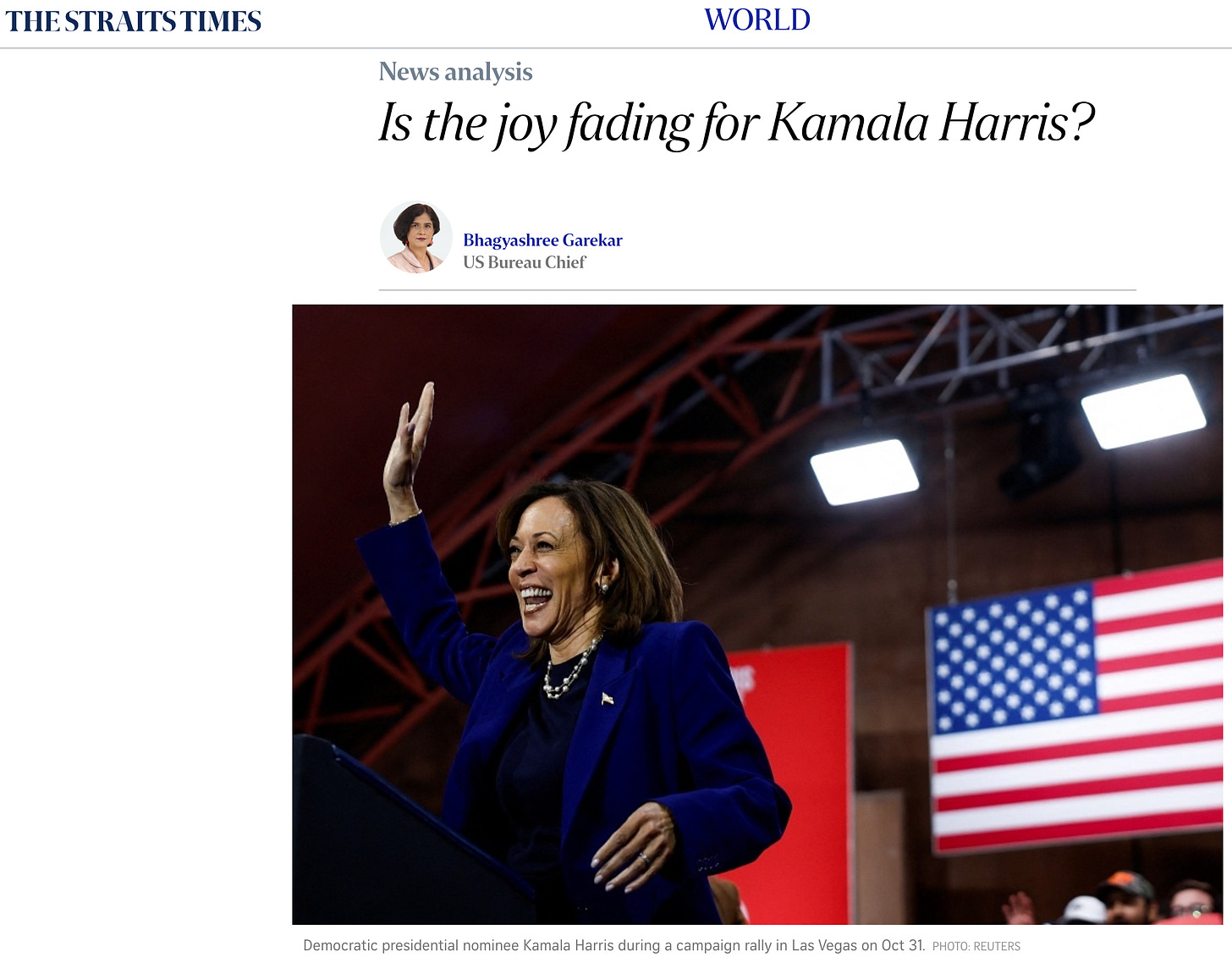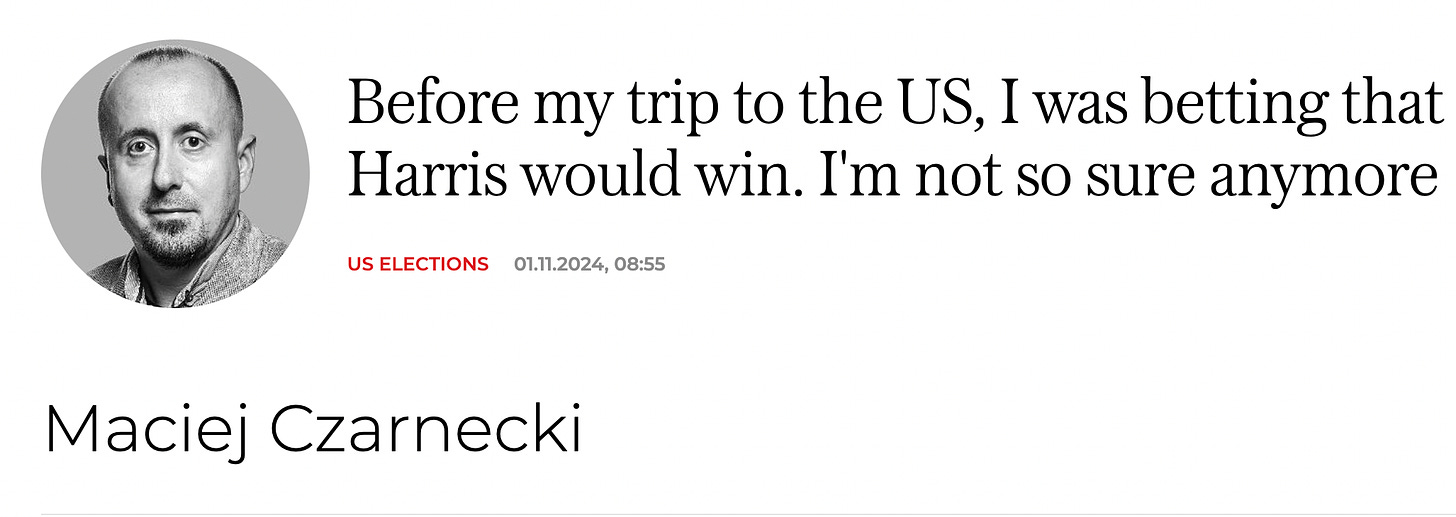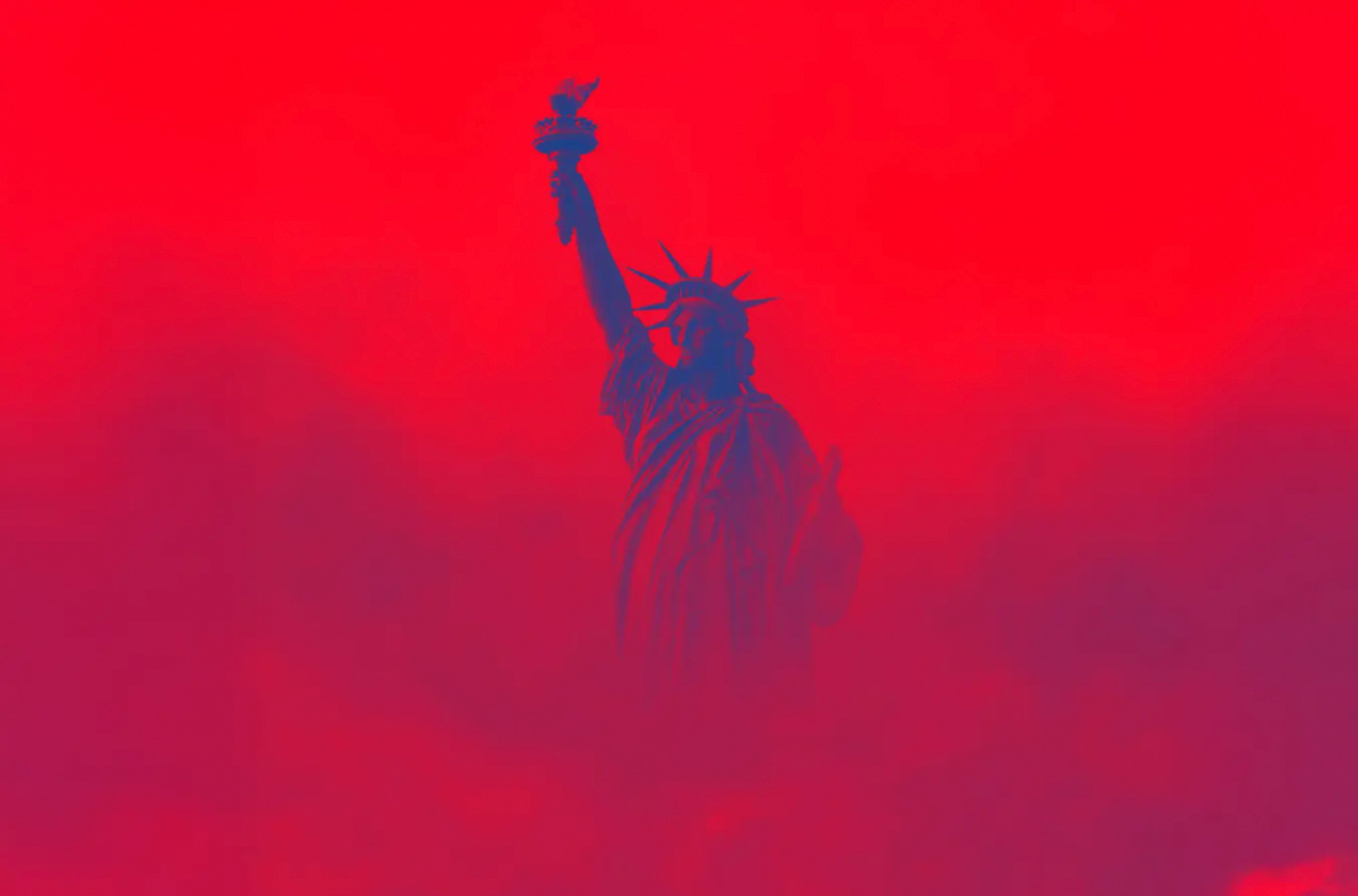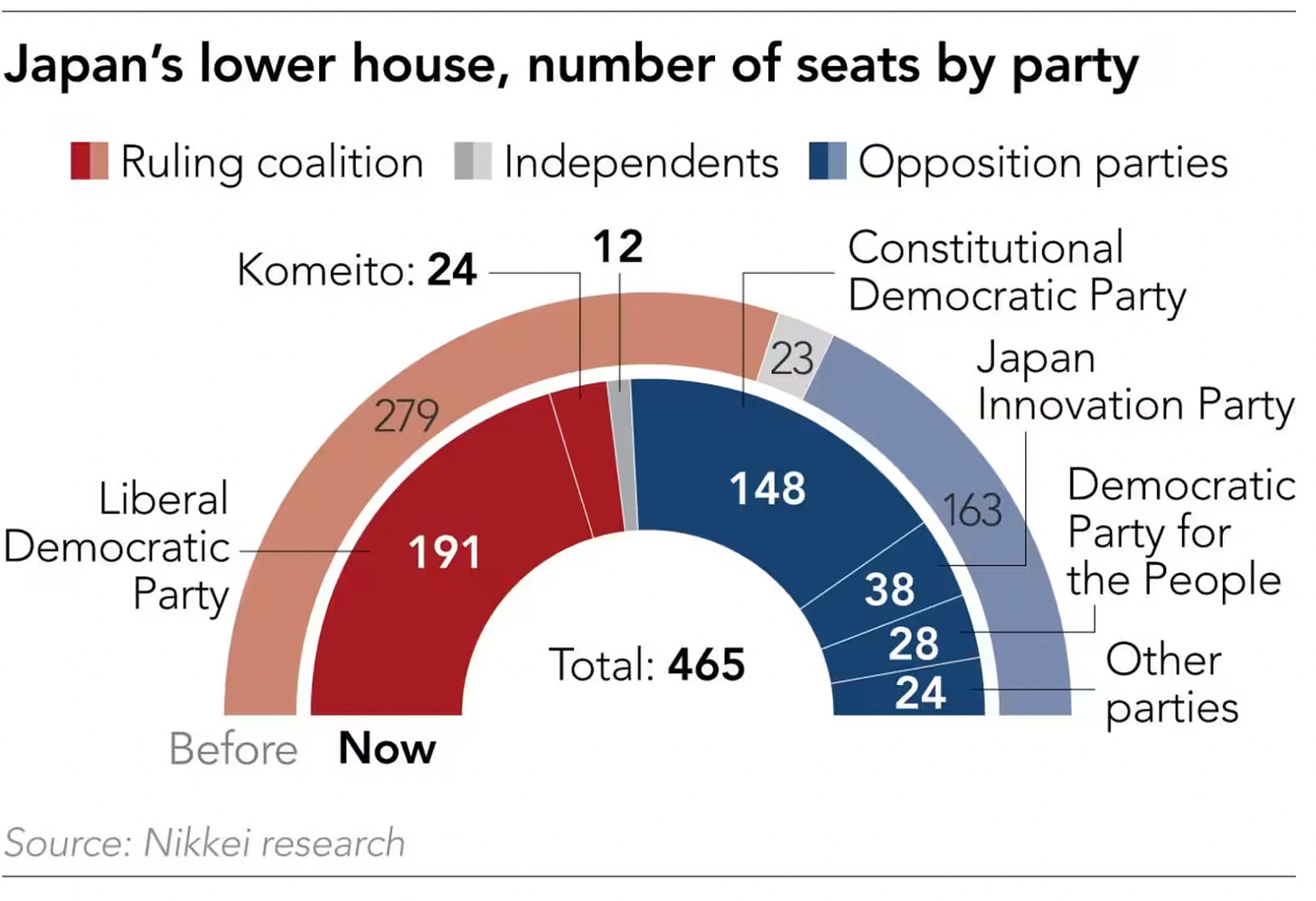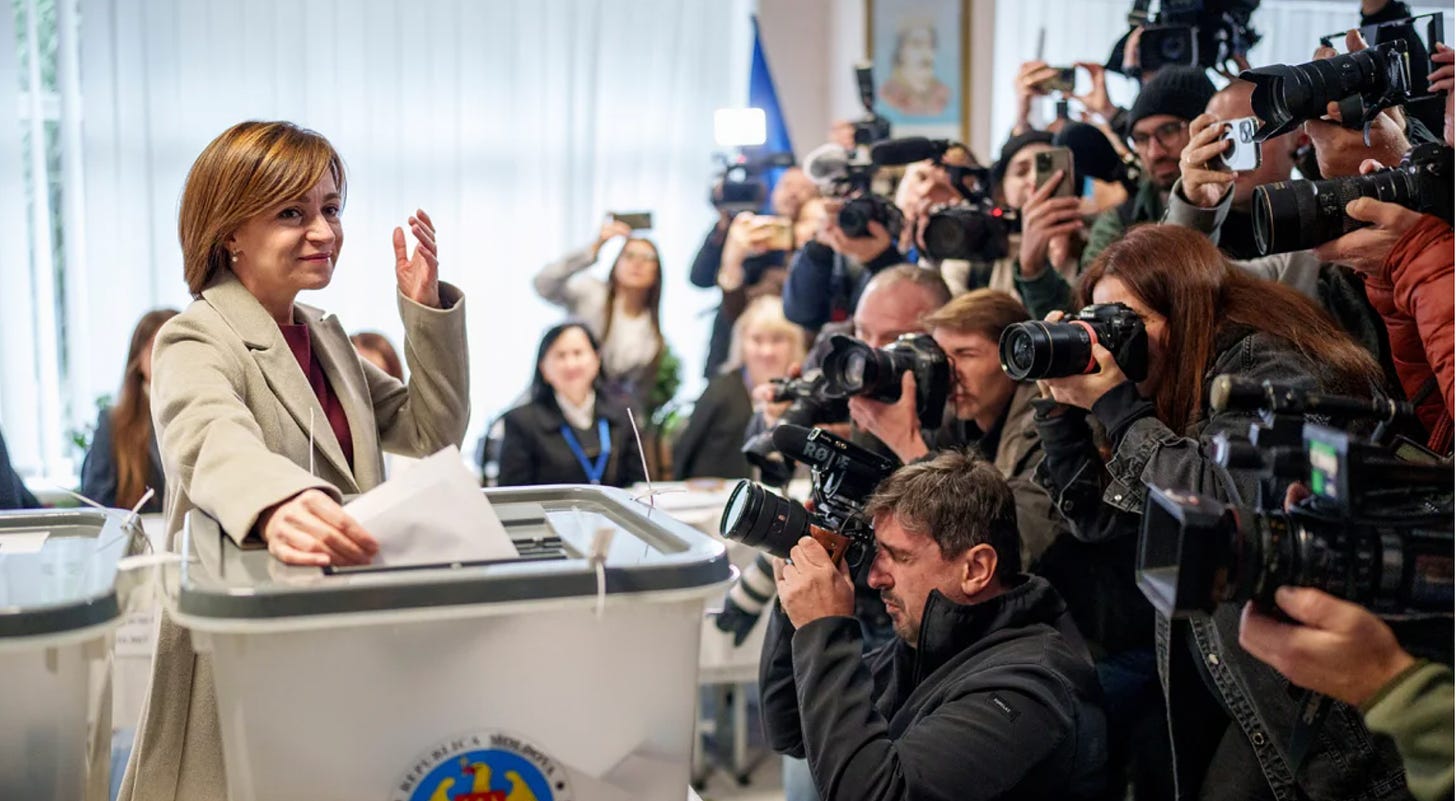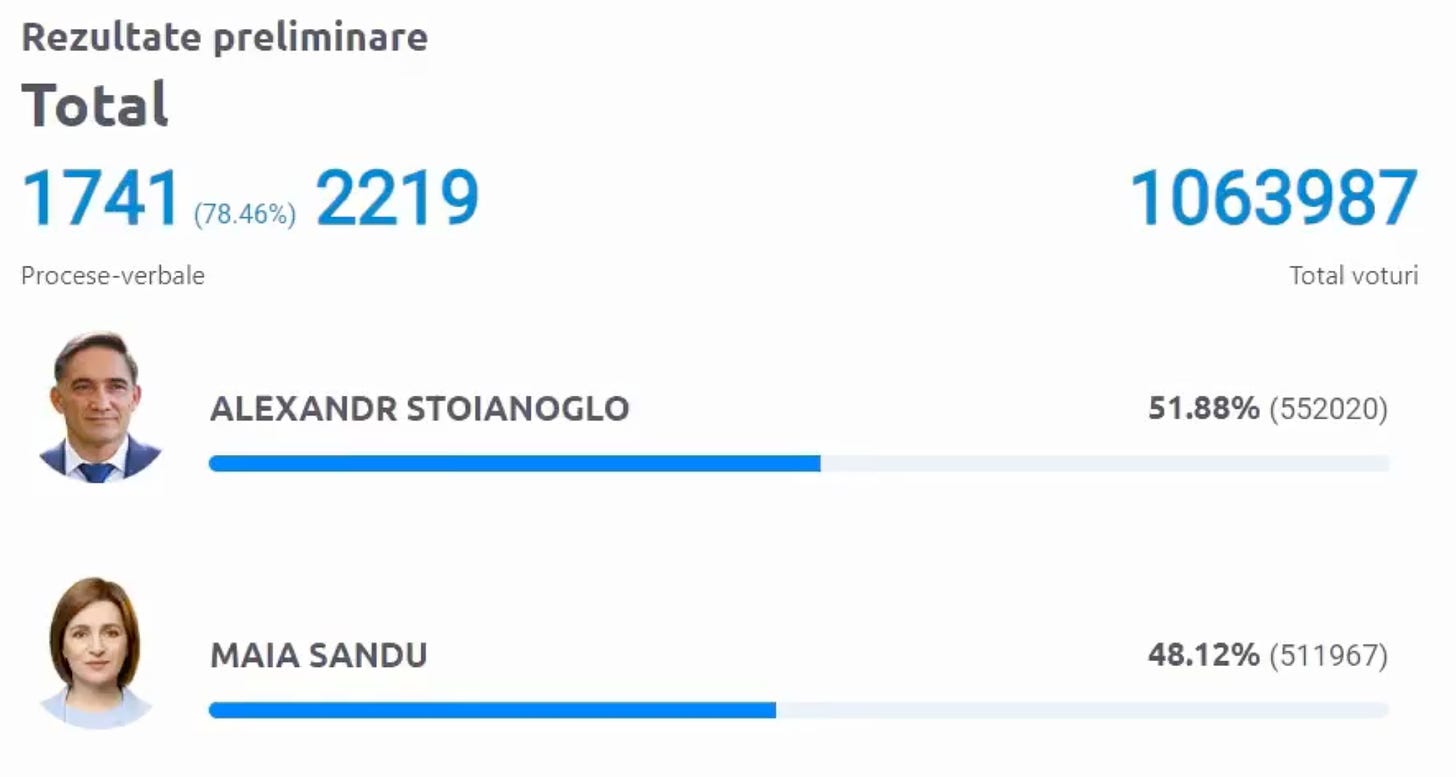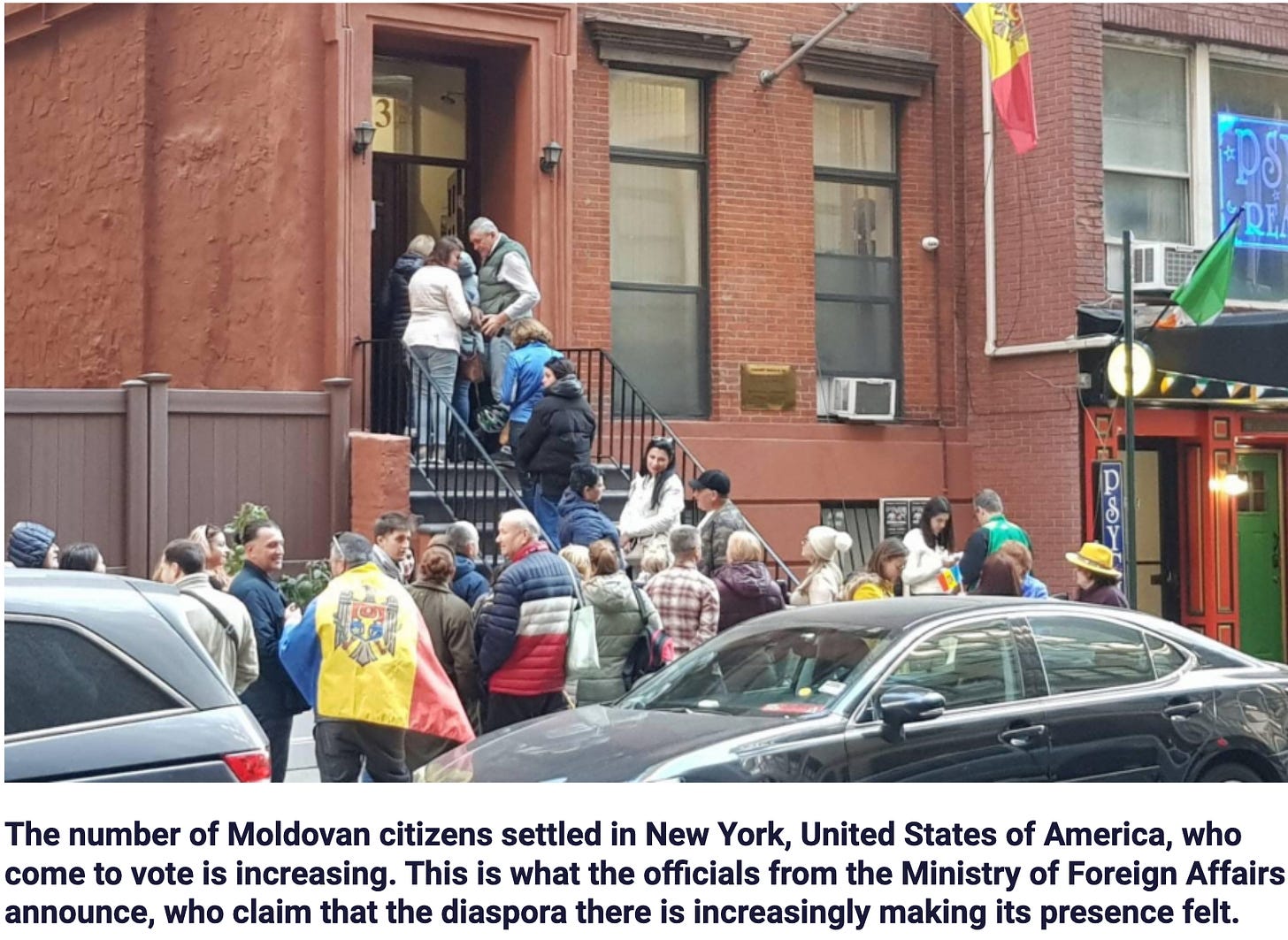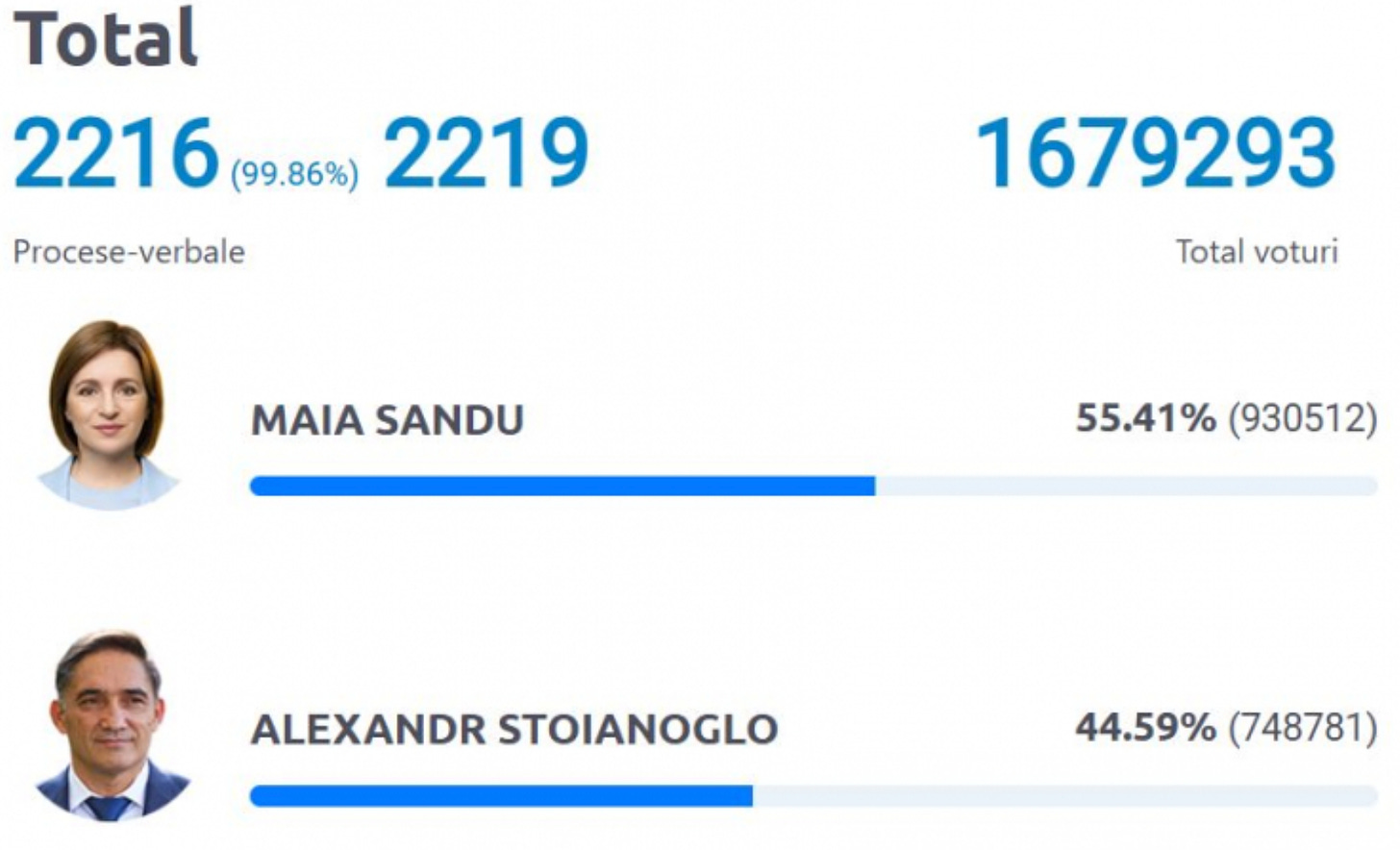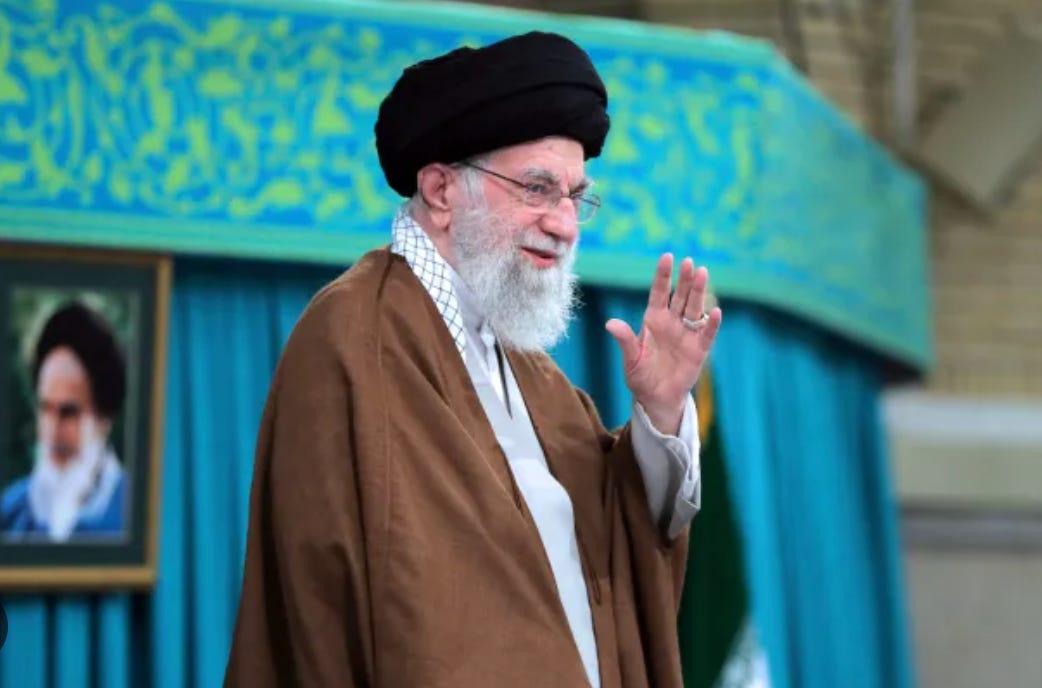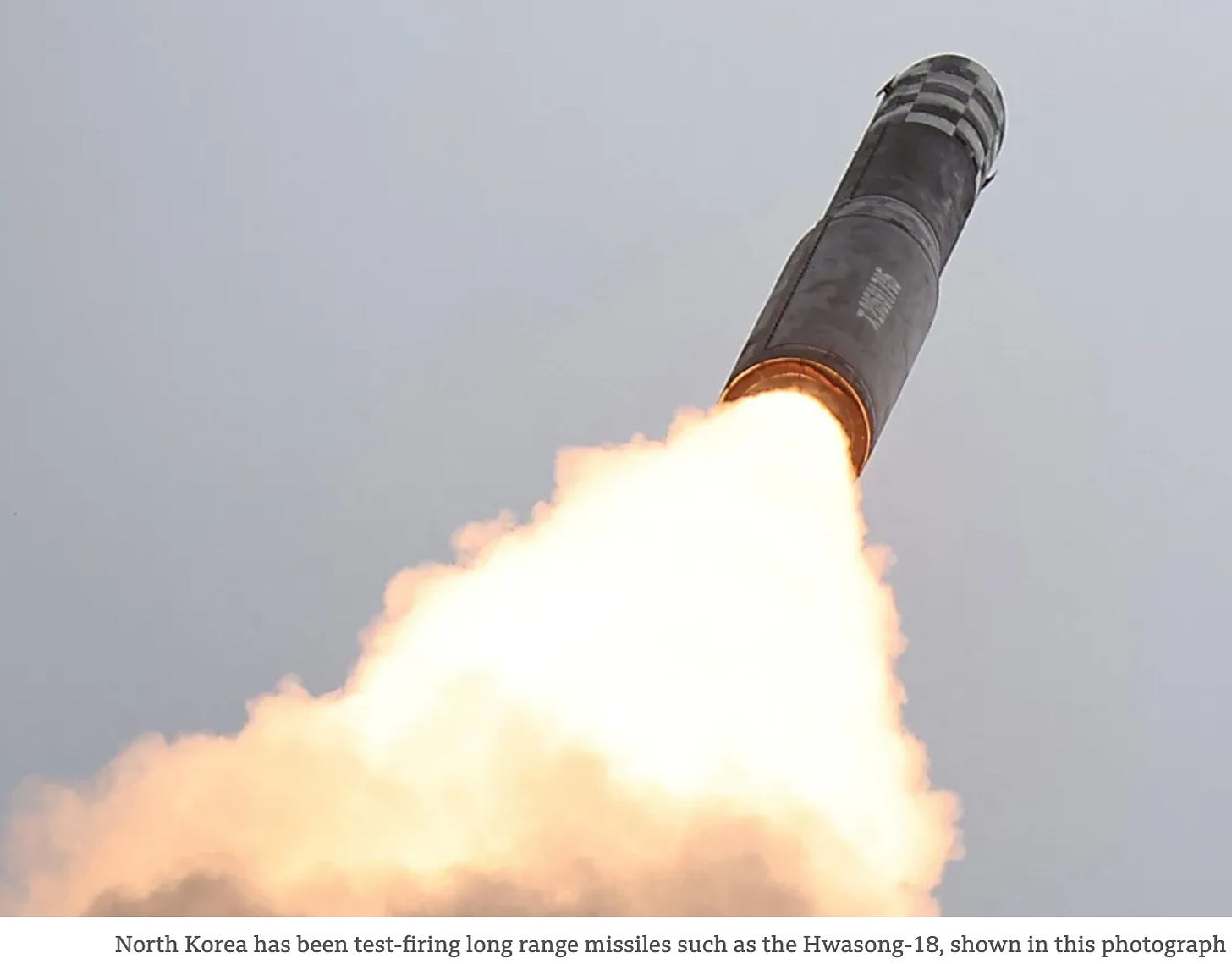TWTW: The World This Week #115 + Elections 2024
Elections: America on the edge…Japan over the edge…Moldova saved…Middle East bracing …. Pyongyang comes to Kursk….for our paid subs: where to escape in France…Global cartoonist impunity
In this weekly feature for Andelman Unleashed, we continue to explore how the media of other nations are reporting and commenting on the United States, and how they are viewing the rest of the world.
This week, again in Paris…but monitoring the world, and in the final throes of election fever….
Updating with the re-election of Moldova’s pro-EU president over her Kremlin-backed challenger after quite a scare from the early returns…and ecstatic reaction from neighbors & Europe.
Elections 2024: America, Japan, Moldova
America on the edge…..
Two days to go and the world is very much on edge with America on the brink. From our perch here in Paris, this vote is nearly as inescapable as it is across the pond.
Forget the issues. Le Monde is focused on the rhetoric of the two candidates and its impact on their voters or those who they would attract. First Kamala:
Having rushed into the US presidential campaign at the last minute, Kamala Harris had to urgently put together a speech to convince voters. Fortunately, she was able to recycle a method she has been using for a long time: telling her family's story and using it to structure her speech. This story, which she repeats throughout meetings and interviews, also allows her to emphasize her profound differences with Donald Trump, whom she never ceases to castigate.
Kama Harris’ tips for seducing electors
I took on the great Wall Street banks … holding those banks responsible for their frauds.
Donald Trump has been found guilty on 34 counts of fraud.
And then it’s Trump’s turn:
Donald Trump has a secret to convince voters to vote for him and beat Kamala Harris in the 2024 US presidential election. When he speaks, he uses short sentences made up of simple words so that as many people as possible can understand him. Subject, verb, object. In theory, according to linguists, even a 9-year-old child can grasp the meaning of his words.
Using and abusing this rhetorical device, Donald Trump delivers speeches that follow one another and are similar. In particular, he praises the benefits of his time in the White House and castigates his adversaries, particularly foreigners and Democrats. Even if it means distorting reality to serve his vision of the world.
Donald Trump manipulates you, here’s how he does it
Trump: 10 words per sentence
Obama: 20 words per sentence
Le Monde also sent their venerable Washington seer, Gilles Paris, to Dearborn, Michigan where he found an important challenge to Harris and benefit for Trump:
In Michigan, the Middle East conflict weakens Kamala Harris
A number of votes of Arab origin in this pivotal State do not forgive the Biden administration for his help for Israel in the war in Gaza and Lebanon.
Meanwhile, their reporter stumbled on a poster for third party spoiler Green Party candidate Jill Stein:
Meanwhile, an anniversary!
Incidentally, Le Monde is about to celebrate its 80th birthday—two months younger than Andelman (before Unleashed)….
Its first edition dating to December 18, 1944….which is what brought Gilles Paris back to the U.S., to examine as a part of the paper’s long and illustrious history:
During his first trip across the Atlantic in 1945, Hubert Beuve-Méry could not have imagined that, decades later, Barack Obama and Kamala Harris would dominate the American political scene.
Le Monde and the United States, what a story! Fascination, repulsion, admiration, circumspection: everything is mixed in the constant gaze on the other side of the Atlantic for almost eighty years. Culture, diplomacy, economy, politics: everything is followed under a microscope. The founder of the daily newspaper, Hubert Beuve-Méry, returned circumspect from his first trip there, in the spring of 1945, only a few months after the publication of the first issue of the newspaper.
He went there on the occasion of the conference that would bring the United Nations to its baptismal font in San Francisco. The European measured the decline of his continent there, and the man—known for his austerity—discovered on this occasion another that was crumbling under abundance, while he had left a Paris still under the yoke of rationing. Unfamiliar with English, which did not help, the Jansenist was, deep down, not at ease with the claimed and ostentatious materialism of the United States. They represented, he was intimately convinced, a double threat to France, both economic and moral. Not really a sentiment to trumpet, however, while the new superpower still enjoyed, among the first readers of Le Monde, the traits of an army of liberators.
In Asia, which is as mesmerized as Europe over Tuesday, the fear of a Trump victory is even more palpable. In the leading Singapore daily:
It’s four days before election day in the US, and the Democrats are panicking. That’s not unusual. Veteran political observers say that the party is prone to performance anxiety. The Republicans, on the other hand, seem to be bordering on overconfidence as the big day nears….
The story so far in polls is this: Since mid-September, after generating a surge in enthusiasm by replacing her boss, President Joe Biden, on the ticket, Vice-President Kamala Harris is seeing support cool somewhat. Her stock in most national and swing state polls has slid a little, while her Republican opponent Donald Trump’s has risen by a little, with the two presidential hopefuls now running neck and neck.
The leading Polish daily Gazeta Wyborcza devotes its entire front page to the question:
Will America still be great? [and fills pages 4 through 13 with its answers]
Correspondent Maciej Czarnecki reports from Pittsburgh:
It seemed to me that after a chaotic four years in power, two impeachments, 91 criminal charges, countless scandals and affairs, and pitting Americans against each other, Donald Trump had too much of a negative electorate. Yes, I knew that millions of followers idolized him—after all, I had spoken to them many times at rallies. But I didn’t believe that he could attract significantly more than the 74 million votes he received four years ago and break the ceiling that separates him from winning.
Americans are driven by different kinds of frustration
After 10 days of driving mostly around Pennsylvania, a trip to New Jersey, and talking to voters during a quick trip to New York for the former president's rally at the famed Madison Square Garden, I'm no longer so sure.
Because, in addition to the reluctance, and sometimes even fear or disgust of some sections of society towards Trump, in some parts of the country there is also an overwhelming general frustration. It is expressed mainly by Republicans, but not only. They blame the Democrats for the problems that have been growing for decades (the incomes of 90% of Americans have not kept up with GDP growth since the 1980s, and no American government has yet managed to secure the southern border), because they are the ones who govern now.
We’ve added the emphasis in the final line because this really seems to explain so much about how Arabs (denigrated mercilessly by Trump when he was in office), white women (even in the face of the GOP war on abortion), and young men attracted by Trump machismo can abandon what should be their clear interests and consider returning him to the White House.
Eric Gujer, editor of the Swiss daily Neue Zürcher Zeitung told his readers:
For Trump, politics is the brutal struggle for power. This means he fits into the new world order.
Trump is the symptom of epochal changes: the era of freedom is followed by the era of the jungle with the law of the jungle.
Still, there are some who might even welcome the arrival of Trump in power, as Politico Europe observed:
Here’s a dirty little secret about the U.S. presidential election: Some European officials think a victory by former President Donald Trump could be what the European Union needs to muscle up on defense and get tough on China.
“The return of Trump would be a beneficial shock that will enable the EU to move forward, like the pandemic or the energy crisis following the war in Ukraine,” said one senior EU diplomat. This view, shared confidentially by several EU diplomats and EU officials, doesn’t stem from affection for the Republican candidate or his policy proposals.
A Trump presidency would be so hostile to Europe, the thinking goes, that the bloc would have no choice but to bolster its defense spending, beef up its tech sector and clarify its China policy, they added. Still, officials say they have painful memories of Trump’s first term when he berated leaders, called Brussels a “hellhole,” and unleashed a trade war on the bloc.
From Ukraine to defense and to Europe’s fight against economic decline, a Trump victory could have seismic effects on the bloc’s future. For some Europeans, such changes could be positive.
Across the world, the burdens of incumbency have all too often been insurmountable even in the clear face of autocracy or demagoguery that most media see is the foundational belief of Trump and his followers.
In Japan, the leading daily Asahi Shimbun leads:
“In the closely contested US presidential election, the final strategy is to appeal to the key ‘wavering voters’”
While its columnist “compares the shame of the US presidential election to the strangeness of Japan's general election.”
Japan: Back to the future?
Strange indeed. As last Sunday, the Liberal Democratic Party, which has held an unchallenged majority, ruling Japan with just two brief interruptions since 1955 and continuously for the past 15 years, was turned out by voters in a snap national parliamentary election.
The Asahi explains a good part of the reason—it’s incumbency, stupid:
Citizens are angry over the decline in real wages, and are resisting the existing rulers, calling for a change….
In the last quarter century, real hourly wages in Japan have not risen at all. Even so, prices are low, and the rate of inflation has been low, so people have been able to get by somehow. Then, over the last three years, inflation has occurred due to the weak yen, and real wages have dwindled significantly. Life has become extremely difficult, and anger at the threat to one's livelihood has led to the rise of Japanese-style anti-establishment (resistance to the existing ruling class) political parties.
Kyodo News explains what happened since the vote this past week:
Prime Minister Shigeru Ishiba had hoped calling an election would allow him to gain a firmer grip on power. Instead, his political capital has waned, leaving his premiership hanging by a thread only a month after taking office.
Japan has been plunged into political uncertainty since the 465-seat election, with both the LDP and the CDPJ scrambling to secure the election of their respective leaders as prime minister when parliament convenes for a special session, likely on Nov. 11.
For either LDP president Ishiba or CDPJ leader Yoshihiko Noda, who served as premier for over a year through December 2012, to become the next prime minister, they need to get majority support. If neither reaches the threshold, the vote will proceed to a runoff.
Moldova saved on the brink
It was the vast diaspora that helped Moldova stave off what early returns looked like a defeat for incumbent, pro-European President Maia Sandu, winning a second term over her challenger, Kremlin acolyte Alexandr Stoianoglo.
Early returns an hour after the polls closed at 9 pm did not look good for the incumbent….
But with a record turnout of 53.9% of the nation—more than 1.6 million voters—the final 20% of the votes from substantial expatriate communities in Romania, England, Germany, the US and Canada gave President Sandu the victory.
It was a narrower margin than four years ago, but still quite a decisive 55.41% to 44.59%—a nearly 200,000 vote margin.
As the Kyiv Independent reported from neighboring Ukraine—with perhaps the highest stakes of having a Kremlin-dominated government on its southwestern flank:
"We proved that by uniting we can defeat those who wanted to bring us to our knees," Sandu told reporters in Chișinău in the early hours of Nov. 4.
She wasn't just talking about Stoianoglo. Sandu has long insisted that the real opponent to her government and Moldova's European path is the Kremlin, which has been waging a hybrid war designed to push Chișinău back into Moscow's orbit.
The reaction from other neighbors and the European Union verged on the ecstatic:
The President of Romania, Klaus Iohannis:
Maia Sandu's victory irreversibly anchors the country's destiny in the European family
The European Union’s Minister of Foreign Affairs Josep Borrell:
Moldova has shown determination to build a European future despite hybrid attempts to undermine democracy.
London’s Guardian reported on the background and the stakes from the capital, Chișinău:
Since the breakup of the Soviet Union, Moldova has gravitated between pro-western and pro-Russian courses. But under Sandu, a former World Bank adviser, the impoverished country has accelerated its push to escape Moscow’s orbit amid its war in neighbouring Ukraine.
The election in this small nation of under 3 million people in south-eastern Europe follows a referendum in which a slim majority voted in favour of pursuing membership in the EU.
The results of the referendum and first round of the election were marred by allegations of a Moscow-backed vote-buying scheme. Sandu and her allies have accused Russia and its proxies of leading a large-scale campaign involving vote-buying and misinformation to sway the election. They accuse the fugitive Moldovan businessman Ilan Shor, a vocal opponent of EU membership, of running a destabilising campaign from Moscow.
“Moldova has faced an unprecedented assault on our country’s freedom and democracy, both today and in recent months,” Sandu told supporters in the capital of Chișinău after the election results were announced.
If anything, the stakes and the interference were even more intense in Sunday’s second round. And the questionable tactics of Russian operators were ever more flagrant. As Ukraine’s Espreso news service reported:
Many potentially pro-Russian voters were being transported to polling stations. Three polling stations have opened in the [border] village of Varniţa in the Anenii Noi district, where long queues have formed. Hundreds of people from Transnistria came to vote. This situation was also seen during the 2020 presidential elections when there were instances of organized transportation of voters supporting Igor Dodon,” of TV8 noted.
The TV8 network added that “some companies located in Transnistria allegedly provided transportation for employees so that they could travel to Varnita and vote.”
The breakaway Moldovan territory of Transnistria, sandwiched between Moldova and Ukraine is controlled by Russian interests backed by some 1,500 Russian troops stationed in the province. A victory by Stoianoglo would unquestionably have given his supporters freer rein and he had pledged to seek an audience with Vladimir Putin as one of his first actions as the nation’s leader.
Andelman Unleashed has upgraded this on Monday morning with near-final results.
A Paris initiative: What if the world could vote?
Here’s your chance. Paris-based tech entrepreneur Jamie Rosen and his Mexican architect wife Mariana Gomez Pimienta and their teenage children at the Ecole Jeannine Manuel, a bilingual school in Paris, created a website to allow the world to do just that—cast (unofficial) ballots.
The site is The World Vote and it has accumulated a huge worldwide vote (the map tells it all) on every continent. So far, Harris is well in the lead, but there are some surprising Trump pockets: Chad and Congo in Africa, Oman in the Gulf.
But the website is still young. So, Vote—your vote may not count in sending one or the other to the Oval Office, but will certainly provide a most intriguing counterpoint of the winner (or loser’s) standing in the world.
How others see the World
And the wars go on…and on….
Just when we thought Israel’s latest attack on Iran showed a modicum of restraint and Iran kept relatively silent in the interim, Supreme Leader Ayatollah Ali Khamenei woke up Saturday and delivered a scalding reply as Al Jazeera reported:
Supreme Leader Ayatollah Ali Khamenei has warned Israel and the United States of “a crushing response” for actions against Iran and its allies, according to state media.
Khamenei, 85, made the remarks, addressing students ahead of the anniversary of the 1979 takeover of the US embassy in Tehran by hardline students—which cemented the decades-long enmity between Tehran and Washington that persists today.
Iranian efforts “to confront the global arrogance and the criminal apparatus that governs the world order today will certainly not fail”, Iranian IRNA news agency reported. “Arrogance means comprehensive economic, military and cultural domination and the humiliation of nations,” he said.
Meanwhile, at home in Tel Aviv, Haaretz had another surprise for the Israelis:
Netanyahu Exploiting Assassination Threat to Avoid Testifying in His Corruption Trial
Benjamin Netanyahu began this week to prepare the ground for delaying his testimony in his ongoing graft and corruption trial, which was scheduled to begin in a month and a day.
TV reporter Michael Shemesh aired quotes from a private conversation, in which the prime minister warned of a drone attack on the Knesset and complained that the sessions there are being held as usual. That morning the cabinet meeting was moved from Netanyahu's office to the fourth sub-basement in a Jerusalem building, for security reasons.
At the same time, Haaretz’s fears were well-articulated:
Victory for Trump Could Mean Defeat in the Battle to Save Israel's Democracy
If the Orange Threat is elected president next week, a critical outpost in the battle for our democracy will fall…
With the announcement of the results of the U.S. presidential election, a new chapter will open in the October 7 war. The American election has been hanging in the air all along, hovering over the bloody campaign we got into. In a certain sense, it has been clear to everyone that until the winner is named, the Middle Eastern entanglement at which we're at the center won't begin to be resolved – no hostage release, no end to the war in Gaza, no agreement with Lebanon.
The man whom Prime Minister Benjamin Netanyahu and his supporters want in the White House is well known. Over the past year, Netanyahu has acted both openly and in the background to undermine the Democrats' chances and give a boost to Donald Trump. But as the Americans say: Be careful what you wish for.
Special for the Paid !
Andelman Unleashed has unleashed new, (lightly) paid tiers.
Now we'll be offering, going forward, for every new, annual paid subscriber, a free first edition of my last book inscribed by the author:
A Red Line in the Sand: Diplomacy, Strategy & the History of Wars That Might Still Happen
All just another perk for our cherished, paid members of our Unleashed family, along with our closing cartoon each week from Cartooning for Peace, regular zoom chats, and other special features en route… so do sign up… cheaper than a monthly mocha grande.
This will also help us subscribe to more (expensive!) media across the globe and support great journalism in multiple languages.
And then there’s another looming conflict
Kim Jong-un is asserting his power, on multiple fronts. As the BBC reported:
North Korea has fired an intercontinental ballistic missile, which flew for 86 minutes—the longest flight recorded yet—before falling into waters off its east…
The ICBM was fired at a sharply-raised angle and reached as high as 7,000km (4,350 miles). This means that it would have covered a further distance if it were launched horizontally. This launch violated UN curbs and came at a time of deteriorating relations between the two Koreas and Pyongyang's increasingly aggressive rhetoric towards Seoul.
South Korea had also warned on Wednesday that the North was preparing to fire its ICBM close to the US presidential election on 5 November.
But the question remains whether North Korea has the technology to reach and target the US with a missile carrying a nuclear warhead. Enter Putin and Russia, as Defense One reported:
South Korea’s defense minister said Moscow might send Pyongyang dangerous missile technology that he said would “escalate tensions” across the Korean peninsula and make North Koreans a far more threatening force.
“There is a high possibility that North Korea, in exchange for their troops’ deployment, would ask for cutting-edge technology,” Kim Yong-hyun said. Kim said the requests would likely be in the areas of tactical nuclear weapons, ICBMs, reconnaissance satellites, and missile submarines.
Finally, there are those North Korean troops—at least 12,000 of them headed to Russia or already on the cusp of deployment in the war with Ukraine. Since North Korea hasn’t engaged in a shooting war since its armistice with the South in July 1953, battle-hardened troops of his own would be a most appealing outcome of Kim’s loan to Putin, beyond any other trade. Still, the Institute for the Study of War (ISW) expressed some reservations:
Russian forces are suffering over 1,200 casualties a day (or about 36,000 casualties a month), and recent US estimates placed Russian recruitment at between 25,000-30,000 new soldiers per month—meaning Russia is just shy of being able to replace its current rate of frontline losses at a 1:1 ratio. The 8,000 North Korean soldiers reportedly preparing to enter combat in Kursk Oblast thus represent about one week's worth of casualties across the entire frontline. It remains unclear exactly how Russia intends to leverage North Korean manpower, but the commitment of North Korean troops into the type of highly attritional offensive operations that Russia has been pursuing is very likely to lead to high North Korean casualty rates.
ISW recently assessed that North Korea likely decided to engage in the war on Russia's behalf in order to gain valuable combat experience in a modern war but noted that the way that the Russian command uses North Korean troops in combat will impact the ability of North Korean forces to meaningfully internalize and disseminate combat experience. If North Korean troops face the same casualty rates as Russian forces, then the battlefield lessons Pyongyang hopes to learn will be undermined, and Kim is unlikely to commit his forces to face such losses on the battlefield indefinitely.
In other words, Kim is likely to have little patience with the meat-grinder kind of war Putin seems prepared to wage without letup. In terms of the actual progress, it’s clear from these ISW maps six weeks apart, there has been only marginal progress by Moscow in efforts to reclaim its territories Ukrainian troops seized in their first lightning offensive:
So this is what our paid subs can enjoy!
Escaping to France….some ideas where to go and how? And cartoonists around the world are marking a solemn moment for themselves and their colleagues imprisoned or under siege…..
Keep reading with a 7-day free trial
Subscribe to Andelman Unleashed to keep reading this post and get 7 days of free access to the full post archives.





